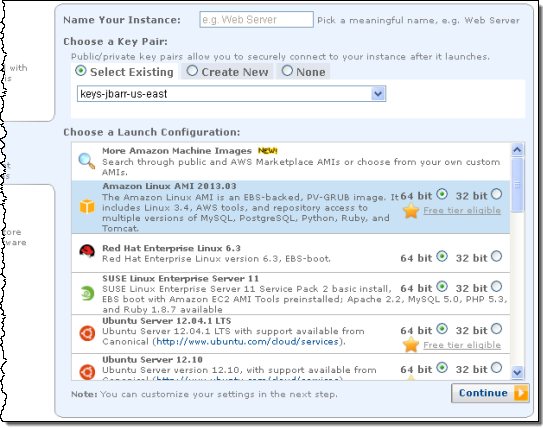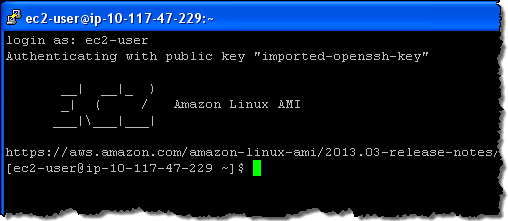AWS News Blog
Amazon Linux AMI 2013.03 Now Available
|
|
Max Spevack runs the team that produces the Amazon Linux AMI. Today he’s here to tell you about the newest version of this popular AMI.
— Jeff;
Following our usual six month release cycle, the Amazon Linux AMI 2013.03 is now available.
As always, our goal with the Amazon Linux AMI is to ensure that EC2 customers have a stable, secure, and simple Linux-based AMI that integrates well with other AWS offerings.

Here are some of the highlights of this release of the Amazon Linux AMI:
- Kernel 3.4.37: We have upgraded the kernel to version 3.4.37 which is part of the long-term stable release 3.4 kernel series. This is a change from the previous releases of the Amazon Linux AMI, which were on the 3.2 kernel series.
- OpenSSH 6: In response to customer requests, we have moved to OpenSSH 6 for this release of the Amazon Linux AMI. This enables the configuration option of AuthenticationMethods for requiring multi-factor authentication.
- OpenSSL 1.0.1: Also based on customer requests, we have added OpenSSL 1.0.1 to this release while retaining compatibility with OpenSSL 1.0.0.
- New AWS command line tools: We are excited to include the Developer Preview of the new AWS Command Line Interface. The aws-cli tool is written in Python, and provides a one-stop-shop for controlling multiple AWS services through the command line.
- New and updated packages: We have included a number of new packages based on customer requests as well as updates to existing packages. Please see our Amazon Linux AMI 2013.03 release notes for more information.
The Amazon Linux AMI 2013.03 is available for launch in all regions. Users of 2012.09, 2012.03, and 2011.09 versions of the Amazon Linux AMI can easily upgrade using yum.
The Amazon Linux AMI is a rolling release, configured to deliver a continuous flow of updates that allow you to roll from one version of the Amazon Linux AMI to the next. In other words, Amazon Linux AMIs are treated as snapshots in time, with a repository and update structure that gives you the latest packages that we have built and pushed into the repository. If you prefer to lock your Amazon Linux AMI instances to a particular version, please see the Amazon Linux AMI FAQ for instructions.

As always, if you need any help with the Amazon Linux AMI, don’t hesitate to post on the EC2 forum, and someone from the team will be happy to assist you.
— Max
